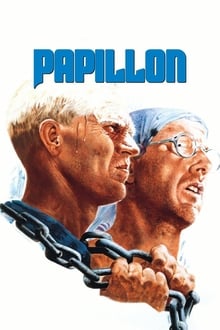
Grim and authentic telling of Henri "Papillon" Charrière's time at Devil's Island.
Directed by Franklin J. Schaffner (Planet Of The Apes/Patton), Papillon is adapted for the screen by Dalton Trumbo & Lorenzo Semple Jr. from notorious French felon Henri "Papillon" Charrière's own novel. It stars Steve McQueen (Papillon) & Dustin Hoffman (Louis Dega), is primarily shot in Jamaica & Spain with Fred J. Koenekamp (The Towering Inferno) on photography duties and Jerry Goldsmith provides the score.
Henri "Papillon" Charrière was a crook, a bad egg, he however was sent to the notorious, inescapable, prison fortress of Devil's Island for a murder he didn't commit. The film, as is the book, is a fictionalised account of Charrière's time at the penal colony.
The film is probably best described as being a stirring drama of friendship under duress, endurance and opportunism, all neatly blended with an adventure based heart. Schaffner directs it with great technical skill, for in a film with minimal dialogue, he manages to perfectly stifle the viewer with a hot sweaty atmosphere. Something that is crucial for us to feel the confines of this penal colony life. These men are doing hard time, lets not soft soap it Hollywood style, lets get the feel right, something, that much like Don Siegel also did in 79 with his excellent Escape From Alcatraz, Schaffner does exceptionally well. He is helped enormously by two fabulous performances from McQueen & Hoffman.
McQueen is in his element as Papillon. Always an actor whose ability for dominating scenes without using histrionic acting was undervalued, Papillon goes some way to readdressing the myth that he was more about iconography than actual talent. His solitary confinement scenes are sublime, without saying barely a word. As Papillon stave's off starvation, madness and disease, McQueen has such a powerful and believable presence, he pulls us into that five by five paces cell with him. Incredible! Once again tho the Academy ignored McQueen's excellent work and the film only received the one Oscar nomination for Goldsmith's pinging tropical score. Hoffman's great work was something of a given, meticulous as usual in his preparation {he had studied for weeks about penal colony life}, he is the perfect foil for McQueen and the relationship is tender yet never twee. Fine support also comes from Anthony Zerbe as a compassionate leader of a leper colony & Victor Jory as an Indian Chief.
The production was an expensive one, with the original budget of $4 million ballooning to $14 million, making it the most expensive film of 1973. A couple of scripts were jettisoned {money down the drain} before Schaffner enlisted Trumbo to write the screenplay. A good move because Trumbo was able to flesh out character relationships that didn't exist in the source novel. Hoffman himself was adamant that he would only play Dega if the film steered away from a buddy buddy formula and gave Dega intelligent integrity. He got it, which is credit to Trumbo since the Dega character is barely formed in the novel, in fact the film version is an amalgamation of several penal colony characters. Trumbo was rewarded with not only a considerable paycheck, but also a bit part in the movie as the colony commandant early in the piece.
Initial critical reaction to the film was harsh, but the public didn't agree since the theatres were packed and the film made almost $50 million Worldwide. Making it Allied Artists most successful film ever. It has since garnered a massive fan base and has been favourably reassessed by a new wave of critics. Those old complaints about it being too sombre and too enduring to get thru just don't add up. One only has to note the thematics and essence of the story to know this fact. 9/10